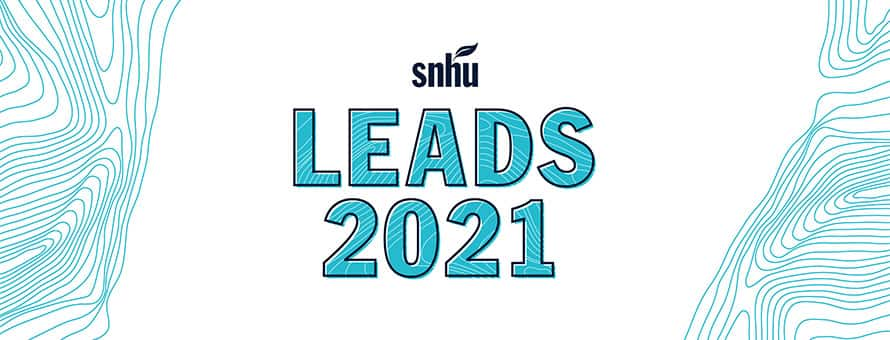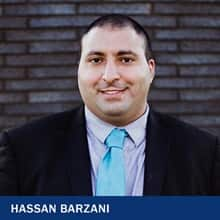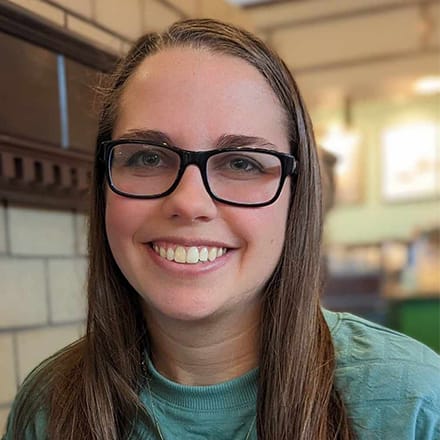Takeaways from SNHU’s 7th Annual Leadership Conference

Southern New Hampshire University (SNHU) students, staff and alumni worldwide participated in the 7th annual LEADS Conference earlier this month. Standing for Lead, Engage, Achieve, Discover and Succeed, LEADS offers sessions aimed at professional and personal development and aims to connect community members as they pursue knowledge during their lunch breaks, evenings, weekend and, for some, late nights and early mornings.
This year, there were three tracks – academic achievement, leadership and career advancement – that totaled 12 hours of content people could choose to attend. While there were 1,210 real-time logins, the sessions were all recorded for those who could not tune in live and for all community members to revisit later.
Before COVID-19, the LEADS conference was held in person on the Manchester, New Hampshire, campus. For the second consecutive year, people came together virtually. This shift to online led to a global experience for participants: Students, staff and alumni from 40 states as well as countries such as Kenya, Mexico, United Arab Emirates and the Netherlands attended.
This expansion in access also garnered many first-time LEADS presenters who shared information in subjects they are experts in while also making a point to ask and answer questions and engage with people through chat functionality.
Living on Purpose
 Stephen Olivarez ’16 '19G has never missed a LEADS conference. “LEADS allows students and alumni to hear real experiences from peers and leaders in the community,” he said. “The topics can go from technical skills to life skills, but it’s real people sharing their journeys … Every single year, I have learned something so powerful.”
Stephen Olivarez ’16 '19G has never missed a LEADS conference. “LEADS allows students and alumni to hear real experiences from peers and leaders in the community,” he said. “The topics can go from technical skills to life skills, but it’s real people sharing their journeys … Every single year, I have learned something so powerful.”
Now a senior project manager at SNHU and an adjunct business instructor, Olivarez presented a topic near to his heart: finding purpose and living it. Having returned to college 13 years into his former career, he believes in the importance of finding a job that fulfills you at an organization with a mission and vision that resonates with you.
“When (you) live on purpose, you live in the moment, and you know what you are doing is for something bigger than yourself," Olivarez said.
 Karl Davidson, who will finish his bachelor’s in operations management this summer, connected with this philosophy. As a veteran who spent 18 years in the U.S. Army, Davidson attended LEADS to develop himself to prepare for his next step. Creating a “purpose roadmap,” he documented his career journey so far and included the actionable steps he is taking toward his dream of becoming a teacher and managing a school.
Karl Davidson, who will finish his bachelor’s in operations management this summer, connected with this philosophy. As a veteran who spent 18 years in the U.S. Army, Davidson attended LEADS to develop himself to prepare for his next step. Creating a “purpose roadmap,” he documented his career journey so far and included the actionable steps he is taking toward his dream of becoming a teacher and managing a school.
“(The session) was a confirmation of my many battles with my own purpose and how to arrive at that destination,” Davidson said. “... I finally was able to clearly define and prepare my own roadmap as a result of this class.” He plans to begin his MEd in Curriculum & Instruction with an Online Teaching concentration later this year.
Keynotes from the Heart
Olivarez’s session on living a purposeful life shared a similar theme as the keynote address by U.S. Army veteran and New York Times bestselling author Wes Moore. Moore spoke about his “search for a life that matters.” He said the most important question people can ask themselves is: Who will you fight for?
 Vicki Graham had that question in mind when she returned to school to pursue her bachelor's in finance with a concentration in financial planning. “I want to help people who don't know how to help themselves,” she said. “... I know how hard it is to properly manage your finances when it feels like your world is falling apart and you're doing everything you can just to survive. But I also know how to overcome these situations.”
Vicki Graham had that question in mind when she returned to school to pursue her bachelor's in finance with a concentration in financial planning. “I want to help people who don't know how to help themselves,” she said. “... I know how hard it is to properly manage your finances when it feels like your world is falling apart and you're doing everything you can just to survive. But I also know how to overcome these situations.”
Having lived in southern Mississippi in 2005, Graham was impacted by Hurricane Katrina and knew well the resiliency Moore discussed in his address.
 After a turbulent 2020 and start of this year, resilience was on many people’s minds. Podcaster Nora McInerny looked at “Redefining Resilience” in the conference’s second keynote address. Alexander Morris, a first-year student pursuing a bachelor’s in computer science, felt particularly impacted by McInerny's idea that tragedy begets growth.
After a turbulent 2020 and start of this year, resilience was on many people’s minds. Podcaster Nora McInerny looked at “Redefining Resilience” in the conference’s second keynote address. Alexander Morris, a first-year student pursuing a bachelor’s in computer science, felt particularly impacted by McInerny's idea that tragedy begets growth.
“This hits close to home for me, and it pushes me to become a better person,” Morris said. “... Each and every day is an opportunity for that growth.”
McInerny’s philosophy on compassion also resonated with Morris, who hopes to put his degree to work in the medical field. “I don’t know what is going on in people's personal lives, but it is my job as a leader to be understanding and a listening ear when someone wants to talk, and I hope that my co-workers or classmates would do the same for me,” Morris said.
A Need for Curiosity in Leadership
While having compassion is vital in leadership, Dr. Linda Ellington also spoke about the role curiosity can play in her seminar, “Curiosity Quotient: Do You Have the CQ DNA to Lead?” A faculty lead at SNHU, she shared how organizations, leaders and employees can use curiosity to develop ideas forge an innovative path.
 As someone studying management, Crys Draconi attended LEADS with the goal of leadership in mind. She was surprised to learn she’s already practicing one of the methods Ellington suggested.
As someone studying management, Crys Draconi attended LEADS with the goal of leadership in mind. She was surprised to learn she’s already practicing one of the methods Ellington suggested.
"My favorite (idea) was about the leadership doodling, which is something I have actually been doing for years,” Draconi said. “As a trained artist, that’s how you figure out how and what you will draw or focus on. So, I implement the same idea into doodling using brainstorming techniques. Who knew it was a thing?”
Stop, Take 15
 In addition to working as an emergency dispatcher, Lynn Fitzpatrick '18 is wrapping up her bachelor's in business administration with a concentration in public administration in just three years. It takes planning to balance school, work and life, and she found adjunct instructor Melanie Schopp’s presentation on time management to be validating. “I learned that it’s okay to take 15 minutes for yourself because it makes you push even harder to get to the end,” Fitzpatrick said.
In addition to working as an emergency dispatcher, Lynn Fitzpatrick '18 is wrapping up her bachelor's in business administration with a concentration in public administration in just three years. It takes planning to balance school, work and life, and she found adjunct instructor Melanie Schopp’s presentation on time management to be validating. “I learned that it’s okay to take 15 minutes for yourself because it makes you push even harder to get to the end,” Fitzpatrick said.
Schopp challenged attendees to consider their committed time (e.g. work, school), maintenance time (eating, sleeping, errands, etc.) and discretionary time (time to do what you want to do) and then presented some time management strategies.
 “This is something that applies to everyone,” Schopp said. “...Time management is something we all are always working on, striving for that ‘balance’ and/or trying to make everything we need/want to accomplish within 24 hours happen.”
“This is something that applies to everyone,” Schopp said. “...Time management is something we all are always working on, striving for that ‘balance’ and/or trying to make everything we need/want to accomplish within 24 hours happen.”
She asked attendees to engage and connect to the subject through the chat, encouraging them to share their experiences and personal strategies. “We can learn so much from each other," she said. "It is amazing to know we are not alone in feeling a certain way, struggling with a certain thing and/or just to know that others are going through the same thing we are in any given day."
Forging Relationships Through Social Capital
 Dr. Rick Mask, director of International Online Programs at SNHU, also wanted those attending his session on “Leadership Through Social Capital and Human Relationships” to consider the experiences of those around them. Presenting this subject felt especially important after a divisive year. “After the last 12 months of pandemic, isolation and a tumultuous political/social climate, I thought it would be the right time to connect our students to the importance of human connection,” he said.
Dr. Rick Mask, director of International Online Programs at SNHU, also wanted those attending his session on “Leadership Through Social Capital and Human Relationships” to consider the experiences of those around them. Presenting this subject felt especially important after a divisive year. “After the last 12 months of pandemic, isolation and a tumultuous political/social climate, I thought it would be the right time to connect our students to the importance of human connection,” he said.
Mask, who has studied social capital for years, shared why relationship building is critical to leadership and explored how to recognize and overcome biases to see everyone as unique individuals. “I wanted alumni and students alike to walk away with a better understanding of how they view themselves and how this impacts their view of others,” he said. “Having a better understanding of ourselves helps us to better connect with and properly lead others.”
 Oricia Ngenyibungi, a student from Kenya pursuing her associate degree, attended more than half of the available sessions and found this one to be especially eye-opening. “Through this session, I realized that I had personal biases that were negatively affecting me, especially socially," she said. "I was overlooking jobs, connections and opportunities that would benefit me by having stereotypes.”
Oricia Ngenyibungi, a student from Kenya pursuing her associate degree, attended more than half of the available sessions and found this one to be especially eye-opening. “Through this session, I realized that I had personal biases that were negatively affecting me, especially socially," she said. "I was overlooking jobs, connections and opportunities that would benefit me by having stereotypes.”
Now that she’s aware of this roadblock, she said she’s able to address it.
 Aarron Dupuis ’19MBA returned to LEADS as an alumnus and found that Mask’s presentation aligned with his annual experience at the conference. “I really enjoyed it because it speaks to the best part of LEADS: being able to connect with so many different people who share a common identity in SNHU,” Dupuis said.
Aarron Dupuis ’19MBA returned to LEADS as an alumnus and found that Mask’s presentation aligned with his annual experience at the conference. “I really enjoyed it because it speaks to the best part of LEADS: being able to connect with so many different people who share a common identity in SNHU,” Dupuis said.
He credits the connections he developed at his first LEADS conference to the various leadership positions he’s served in as a student and now alumnus, such as the Student Advisory Board (now known as the Student Engagement Council) and the Alumni Board of Directors.
Learning Together at LEADS

Alumnus Hassan Barzani ’17G returned for LEADS this year, too, and took advantage of several sessions. A graduate of the master’s in sport management program, Barzani particularly enjoyed the ease in which he could connect to students, alumni and the presenters in the online format and the power of the community. “When all of us are together virtually or in person, it feels like we are learning something new every time to become even better leaders on a global stage,” he said.
Not only did he learn that you don’t need a title to be a leader, but that patience, positivity and the ability to think outside of the box are essential.
Rebecca LeBoeuf ’18 is a writer at Southern New Hampshire University. Connect with her on LinkedIn.
Explore more content like this article

15 Years Later: A Surprise Reunion for Two Grads at Commencement

How Celebrating Small Wins Can Make a Big Difference

Heart, Hope and Some Help Along the Way: SNHU’s Fall Class of 2025
About Southern New Hampshire University

SNHU is a nonprofit, accredited university with a mission to make high-quality education more accessible and affordable for everyone.
Founded in 1932, and online since 1995, we’ve helped countless students reach their goals with flexible, career-focused programs. Our 300-acre campus in Manchester, NH is home to over 3,000 students, and we serve over 135,000 students online. Visit our about SNHU page to learn more about our mission, accreditations, leadership team, national recognitions and awards.


